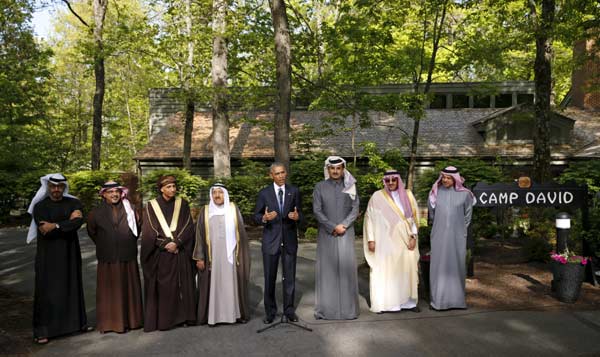US-Gulf summit ends amid concerns of Middle East nuclear arms race
Updated: 2015-05-15 15:25
(Xinhua)
|
|||||||||||
 |
|
US President Barack Obama (C) speaks while hosting the six-nation Gulf Cooperation Council (GCC) at Camp David in Maryland May 14, 2015. [Photo/Agencies] |
"The United States will stand by our GCC partners against external attacks and will deepen and extend the cooperation that we have," he said.
Reflecting those sentiments, leaders put out a joint statement saying that the United States would, if an outside country became aggressive, work with Gulf states to "determine urgently what action may be appropriate," which would include the "potential use of military force, for the defense of our GCC partners."
Moreover, the White House said Thursday that it was open to discussing the possibility of granting Gulf nations "Major Non-NATO Ally" status, although that was not the specific focus of Thursday's talks, Deputy National Security Adviser Ben Rhodes said at a press briefing.
Wayne White, former deputy director of the State Department's Middle East Intelligence Office, noted that Kuwait was granted such status by former US President George W. Bush because it allowed itself to be the major jumping-off point for the 2003 US invasion of Iraq.
The status signifies a closer relationship with the United States with a host of benefits such as cooperative research and development, reciprocal training, and possession of US Department of Defense-owned "War Reserve Stocks" of missiles and ammunition.
Although not a formal mutual defense pact, this would have considerable value in emphasizing an enhanced American commitment to the welfare of the GCC states. While not a definitive "stop sign" of sorts, it does send a message much like "proceed with caution" to those posing potential threats, White said.
KEY GCC LEADERS' ABSENCE
Meanwhile, the talks were somewhat overshadowed by the absence of several key leaders amid rumors of a rift over the US handling of its ties with Iran. Except for the leaders of Kuwait and Qatar, four other leaders of the six-member GCC countries declined the US invitation to attend.
Saudi Arabia's King Salman, a crucial leader in the region, even decided to skip the summit at the eleventh hour and send Crown Prince Mohammed bin Nayef and Deputy Crown Prince Mohammed bin Salman to the summit instead.
Bahrain, an important regional ally that hosts the US Navy's 5th Fleet, announced Sunday that the country's crown prince would head its delegation, not the king. Oman's sultan, who serves as a middleman between the United States and Iran, also did not attend, sending his deputy prime minister instead. The sultan recently returned home after receiving medical treatment.
While the White House denies this as a snub, US experts said Gulf countries obviously are concerned about how the Obama administration is handling the nuclear negotiations with Iran.
Related Stories
US would consider military force to defend Gulf nations: Obama 2015-05-15 09:24
At summit, US tries to calm Gulf leaders 2015-05-15 07:32
US rejects notion that Gulf rulers snubbing Obama summit 2015-05-12 10:58
Gulf nations seek security deal with US 2015-05-12 07:43
Today's Top News
Premier Li says talks with Modi 'meet expectations'
PBOC confirms debt-swap plan
Italy reports 3,600 migrant rescues in two days
Britain names 'BRIC' creator Jim O'Neill as commercial secretary
Putin, Kerry pledge to get ties back on track
China set to delay maiden flight of C919 commercial jet
Ten panda poachers caught in Southwest China
Beijing concerned by Pentagon plan
Hot Topics
Lunar probe , China growth forecasts, Emission rules get tougher, China seen through 'colored lens', International board,
Editor's Picks

|

|

|

|

|

|






